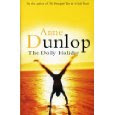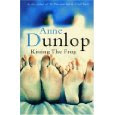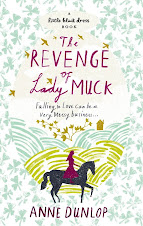I've always hated the skin on my face - it's covered in acne scars.
Once, when I was moderately famous, I went on TV for some book thing and a clever clever make-up artist spent an hour painting in the pock marks - she left my skin flawless - I didn't wash off the make-up for two days.
I was so inspired I flirted with dermabrasion and chemical peels but twenty years ago these were major operations, with a hospital stay, and bandages like the Invisible Man. I resigned myself to bad skin forever...
Until this morning when I had a consultation with Dr. G who suggested I pop in next Thursday for a Fraxel laser skin rejuvenation treatment. He says it will take half an hour. My face will be red for a day afterwards, then covered in little brown dots for two days, then the dots will wash off and I'll have much smoother skin. I'll apply special creams for a month and hey presto - a beautiful complexion....
Monday, May 31, 2010
Saturday, May 29, 2010
The Believers

THE BELIEVERS
Zoe Heller
You remember I told you a few weeks ago that the Impac Award is the richest prize in fiction – €100,000 - and that the shortlisted books are nominated from an international panel of libraries? Well, this week, I visited my local library at the British Club, Bahrain, to search for Impac Award shortlisted books…
And could I find even one of these prestigious short listed books? Well actually yes, I found one – The Believers by Zoe Heller – but from the dearth of ‘Return Date’ stamps on the ticket I can only assume the Brit Club library, Bahrain, was not part of the international Impac selection panel…
The Believers is set in New York. It’s a soap opera style story of the Latvinoff family: dad Joel is a radical lawyer; he’s married to Audrey an Englishwoman; they have two daughters, Rosa and Karla. There is also a foster son, Lenny, who struggles with drug addiction.
As the book opens Joel is preparing for court: he’s defending an Arab- American accused of attending an Al Qaeda training camp in Afghanistan; he’s scouring the papers for a mention; he’s mildly disappointed he has not received any death threats; meanwhile Audrey is preparing his breakfast.
Without doubt it’s Audrey who carries this book – she’s a fascinating character. Plucked from typing pool obscurity by Joel in 1960s London, he married her on a whim, and swept her away from her nondescript life to the big time in the Big Apple. Miss Average Audrey has never been able to really believe her luck that Joel picked her to marry when he could have had anyone; to compensate for the fact she’s utterly out of her intellectual depth with New York’s left wing liberal elite she has become more radical than Joel, more intransigent in her views and more strident with her opinions.
But her self-loathing and insecurity seeps through the pages of the book – daughter Karla’s ambitions to read law like her dad are insidiously undermined with spiteful, hurtful remarks – “I think you might be a bit dyslexic.” Rosa’s efforts to find meaning to her life, she first tries Marxism, then Orthodox Judaism, are dismissed with abrasive insensitivity. (I won’t quote Audrey for fear of offending readers with refined sensibilities - suffice to say she cannot open her mouth but a series of expletives spew out.)
The only person she expresses any degree of affection for is loser foster son Lenny; his problems are so transparently pitiful they make her feel good about herself.
And as for her relationship with Joel: much as she adores him, and even though her life revolves round him, she makes a fastidious point of never being impressed by any of his achievements – ‘deadpan unimpressibility’ is her trademark...
Until Joel suffers a stroke in court and is rendered comatose and inert. Audrey jealously guards his bedside, she will not consider allowing him to die – for forty years she has been the wife of Joel Latvinoff. If he dies, who then will she be?
When shameless brass necked Berenice Mason turns up at Joel’s bedside with proof of a love affair – “he wrote her poems, for God’s sake” - Audrey finally realises that for forty years ‘she had been confusing proximity with intimacy...’
Zoe Heller is an Englishwoman who lives in New York. She is best known for her novel Notes on a Scandal which was shortlisted for the Booker Prize and made into a movie with Cate Blanchett and Judi Dench.
VERDICT: This is a beach read for highbrows – beautifully written, witty, engaging – I devoured it in two afternoons under a parasol by the British Club pool.
Thursday, May 20, 2010
The Cost of Living
So there I was flicking through a back copy of Harper's Bazaar : "Leap into 2010 with Bazaar's ultimate guide to a fresh and healthy new lifestyle" - with advice on how to change your body shape, eating habits, skin and fitness...
And I absolutely want all of it - I want Hypoxi Therapy and a Body of your Dreams Cure at Les Sources de Caudalie Spa, I want IPL and Botox and a skin peel and Meso Glow; I want to spend a week at a fitness bootcamp; I want, I want, I want - except in this case 'I want' will never get for it's all so very expensive!
Seriously now, who has a thousand pounds to spend on a week at a fitness bootcamp? (I've written 'thousand' in words rather than digits so you know my finger didn't slip on the keyboard, adding an extra 0, by accident) - I thought there was a recession - I thought the Great British public were practising thrift and learning to economise and that anyone with a spare thousand pounds would be using it to pay off credit card debt.
Obviously I'm utterly out of touch with reality - either that or I'm reading the wrong magazines.
And I absolutely want all of it - I want Hypoxi Therapy and a Body of your Dreams Cure at Les Sources de Caudalie Spa, I want IPL and Botox and a skin peel and Meso Glow; I want to spend a week at a fitness bootcamp; I want, I want, I want - except in this case 'I want' will never get for it's all so very expensive!
Seriously now, who has a thousand pounds to spend on a week at a fitness bootcamp? (I've written 'thousand' in words rather than digits so you know my finger didn't slip on the keyboard, adding an extra 0, by accident) - I thought there was a recession - I thought the Great British public were practising thrift and learning to economise and that anyone with a spare thousand pounds would be using it to pay off credit card debt.
Obviously I'm utterly out of touch with reality - either that or I'm reading the wrong magazines.
Tuesday, May 18, 2010
Rory Stewart

I've had a serious crush on Rory Stewart since reading about him in The Daily Telegraph last November.
So I was delighted to hear his voice on BBC World Service radio yesterday - talking about his first day in Parliament - he's been elected as an MP for Penrith and the Borders.
Rory Stewart's voice is terrifically posh, yet whimsical, like something out of the 1930s - it's the voice of Lord Peter Wimsey, perhaps Sebastian Flyte, most certainly Boy Dougdale, the Lecherous Lecturer...
How I dreamt of meeting a fellow like him when I was growing up in rural Ireland...
Monday, May 17, 2010
Mutton Dressed as Lamb

As they say in the States - here's the thing...
I've been given this pretty top by my friend who was given this pretty top by her friend who was given this pretty top by her cousin. My friend won't wear it because she has a spotty back, her friend tried it on for her husband and he burst out laughing so she won't wear it; don't know why the cousin won't wear it...
I'm perfectly happy to wear it, in the privacy of my bedroom, but before I slap on some make-up and venture out into the world I need to know - is it too young for me? Afterall I'm on the 'wrong' side of 40 and my boobs have breastfed four children.
Perhaps I should wear a nice cardigan over it?
Saturday, May 15, 2010
House Rules

HOUSE RULES
Jodi Picoult
I don’t think it’s an exaggeration to say Jodi Picoult writes horror stories.
But instead of using zombies to scare us she chooses instead the emotionally charged subject of ‘the sick child’ - the child with brittle bone disease, the child with leukaemia – describing in tortured detail the day to day realities of family life with this sick child. And as if that wasn’t chilling enough, she goes one step further to describe for us, the very worse-case scenarios this sick child might be exposed to...
In House Rules, Jacob Hunt suffers from Asperger’s Disorder, a mild type of autism which was possibly caused by his childhood vaccinations. (Cue panic among the masses of mums about to take their kids for an MMR.) Jacob is academically bright but has negligible social skills; he can’t make eye contact, he speaks in a monotone, he’s interested only in crime scenes, and he panics and goes into melt down when his careful routines are disrupted. Oh, and he’s got a freakish thing about the colour orange...
Jacob’s mother, Emma, cannot accept his medical condition; she insists her son has no ‘mental disease’; she says her son has ‘quirks’.
She says, “We’ve always said Asperger’s isn’t a disability... just a different ability.”
But then, Emma is a paragon. She is almost too good to be true. She remains devoted to Jacob, though her husband has left her, and she doesn’t have family or friends to turn to for support. I might have liked her better if just once in 500 pages she’d raged about the unfairness of it all. Instead she sublimates her frustrations by writing an advice column in the local newspaper while rather priggishly informing us:
“Jacob... is not a cross to bear. He’s my son.”
Emma is convinced her son can comfortably live in the real world – this man of eighteen who will eat only yellow food on Wednesday and brown food on Thursday and blue food on Friday – so Jacob attends a regular High School where he’s ostracised and bullied by his peer group. Emma arranges for a tutor to help Jacob with his social skills – Jess is lovely and kind, and Jacob seems to really like her... Until Jess disappears and her dead body is discovered wrapped in Jacob’s quilt of many colours.
So far, so sad, but this is the scary part – Emma, the loving mother of Jacob, who has spent eighteen years of her life making excuses for his behaviour, accommodating his ‘quirks’ and fighting his corner immediately offers him up to the police. Because she thinks he’s guilty. Because she thinks he’s a murderer.
And even more scary for Jacob – the police are not trained to recognise Asperger’s – in their world an inability to make eye contact during questioning is virtually an admission of guilt... Jacob is arrested and detained, pending a hearing. His careful routines go to pot and he suffers a serious melt down...
Jodi Picoult has first-hand experience of autism – her aunt adopted a boy who was severely autistic. Jodi has vivid memories of her teenage cousin, tall, heavy and strong, throwing violent frustrated tantrums. And of her aunt having to sit on him to get him under control. And of one time in a supermarket, when a concerned shopper called the police, thinking she was a witness to child abuse.
*
VERDICT: Read House Rules only if you have Schadenfreude tendencies... I found it voyeuristic and disturbing...
Saturday, May 8, 2010
The Elegance of the Hedgehog

THE ELEGANCE OF THE HEDGEHOG
Muriel Barbery
There’s a famous quote by D.H. Lawrence which goes: ‘There’s lots of good fish in the sea... but the vast masses seem to be mackerel or herring and if you’re not mackerel or herring yourself you are likely to find very few good fish in the sea.’
The Elegance of the Hedgehog tells the stories of two such individuals – neither mackerel nor herring – both female and both cursed by insatiable intellect to think profound thoughts all their lives.
Paloma, from a privileged background, cannot watch the haka at a game of rugby but she must spout about ‘motionless movement’; Renee, a concierge, obsesses about phenomenology until she reaches the conclusion with ‘immense relief’ that phenomenology ‘is a fraud’.
Lucky then for this unconventional pair and everybody else who knows them that they live in the same apartment block in a very swish area of Paris. But unlucky that due to their disparate circumstances – age and social status – it takes forever for them to meet.
By twelve Paloma is so frustrated by ‘the despicable vacuousness of bourgeois existence’ she is determined to end her ‘absurd’ life on her thirteenth birthday. And to burn down the apartment block while she’s at it.
By fifty four Renee is so frustrated by her insignificance she’s as prickly as a hedgehog; few escape her venom; she loathes even herself. After the most harmless of interchanges with one of her employers she vents her spleen by remarking: ‘You know you have reached the very bottom of the social food chain when you detect in a rich person’s voice that he is merely addressing himself.’
Fortunately for Paloma and Renee an intellectual Japanese gentleman, Monsieur Ozu, buys an apartment in their Parisian block. He immediately recognises them both as kindred spirits; he wastes no time getting to know them; he transforms their lives irrevocably....
When The Elegance of the Hedgehog was first published in France in 2006 the author, Muriel Barberry, didn’t expect it to sell. And certainly the story does not follow the ‘mackerel and herring’ definition of what makes a book a best seller: the central characters are waspish and the tone throughout is unashamedly highbrow. Yet the book has currently sold over 2.5 million copies and is translated into several languages. In fact, The Elegance of the Hedgehog has proved to be the exception which proves the rule in publishing and Barberry is quoted as saying she thinks this could be the reason for its success; she says her “cast of improbable characters and clashing perspectives has managed to interest an equally improbable range of readers from very different backgrounds.”
This year The Elegance of the Hedgehog has been shortlisted for the International IMPAC Dublin City Award, worth a whopping €100,000. This is the richest prize in literature and it’s quite an achievement to make the shortlist since all novels first published in English in 2008 are eligible; they are nominated by public libraries from all over the world; The Elegance of the Hedgehog was nominated by libraries in Hungary, Greece, France, USA, Brazil and Canada.
VERDICT: The Elegance of the Hedgehog is an intellectual reworking of a fairytale we all know and love – that of the frog which is kissed by a princess and magically turns into a prince. And they all live happily ever after.
In this story there are two frogs, Renee and Paloma, and the ‘princess’ is Monsieur Ozu. Is the ending happy? I’ll leave that for you to decide.
Subscribe to:
Posts (Atom)







